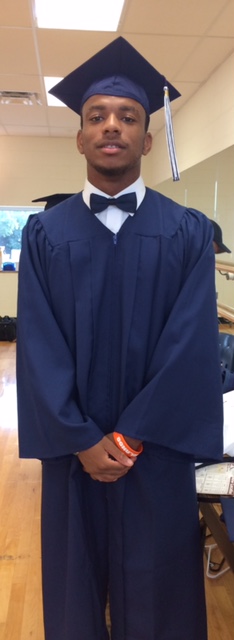Research shows students who complete the Free Application for Federal Student Aid (FAFSA) are more likely to go on to college. But millions of students eligible for financial aid do not fill out the FAFSA – leaving billions of dollars on the table and their potential unfulfilled.In partnership with the National College Access Network, the Kresge Foundation’s Education Program granted $1.6 million to challenge cities across the country to boost FAFSA completion rates. The effort led to the 22 cities raising FAFSA rates by 4.43%.
This is the story of a young Detroiter named Kyron.
“Football taught me that not everything is given to you. If you’re going to win, you have to work hard for it,” says Kyron.

“I have a good work ethic. I always wanted to go to college, even since I was 6 or 7 years old. I had college installed in my mind since I was young. I wanted to go to college and play football.”
“I’m the youngest of my siblings, but I do have young cousins. I hold high expectations for them to go to college, too,” he says. “I stay on them on their grades.”
Kyron has other college dreams besides football. “I’m excited about meeting new people,” he says. “I’m excited to meet the next lawyers and doctors. I am excited about meeting people from different states or different countries. I want to surround myself with people with bright futures, because I have a bright future.”
How he almost missed out on financial aid
Kyron had to figure out how to pay for college. He remembers being surprised about financial aid.
“The principal at my old school gave a presentation. He said financial aid is money you get for college based on your mother and father’s tax return.”
“I was like, wow. I thought you either apply for scholarships or you just pay out of pocket.” He hadn’t heard about other forms of financial aid, like grants or loans.
“But I did not know anything about any FAFSA,” Kyron continues. “I thought you just sent in your mother and father’s tax returns and you just receive money. I didn’t know how important the FAFSA was until it was almost too late.”
Kyron started getting acceptance letters to colleges he’d applied to. But he knew something was wrong.
“I wasn’t getting any money. My friends started receiving financial aid award letters, and I wasn’t. They were getting a lot of money. Some of them got full rides to college. The stuff I received? It said I’ve got to pay $10,000 or $15,000.”
He found out from his school counselor, Ms. Boston, that it was because he hadn’t filled out the FAFSA. “It wasn’t until February that I’m like, okay, let me fill out this FAFSA.”
Filling out the FAFSA with his mom
Kyron talked to his mom about the tax information he needed to fill it out. “I had to explain it to my mom because she and my dad didn’t go to college. I told her, ‘We’ve got to get this done. If you give me your taxes, I’ll fill out everything.’”
“She was like, ‘Which year’s taxes do you need?’ It confused us a bit because we thought we needed her 2016 taxes and she didn’t have them yet. But Ms. Boston told us the FAFSA just needed 2015, the year before.”
Kyron created an FSA ID for himself and his mom. “I put the usernames and passwords up in a safe place that I know will be easy for us to find. Then I filled out the FAFSA. It only took like 30 minutes tops.”
After Kyron completed his FAFSA, Ms. Boston helped him make sure he was getting financial aid from the colleges he’d applied to.
“Every day, Ms. Boston was telling me to call colleges and check my financial aid status. I thank her for that. She is an encouraging person and good individual,” says Kyron.
Pretty soon, Kyron got his financial aid award letter. “I’m getting money for college now. Everybody was getting financial aid, and I was just left out. I would have just been sitting here looking stupid,” he laughs.
Kyron’s advice: Fill out the FAFSA early
“Do your FAFSA as quick as possible. Really get it done. It is very important. Take the time out of the day to do it and get it all over with so you can receive money for college. I can’t stress that enough.”
“Just stay calm,” Kyron says. “One of the schools will give you the financial aid package you need. And get to know your school counselors, too.”
“I have days where I’m kind of nervous about college, but I’m excited to try this new thing for my family. Maybe I could make this a new trend in my family, and we’ll all go to college.”
Kyron will attend Central Michigan University and plans to major in business. He will be playing football in college and hopes to someday start a youth center where kids can play sports.
Editor’s Note: To read more stories like Kyron’s, visit fafsastories.org


